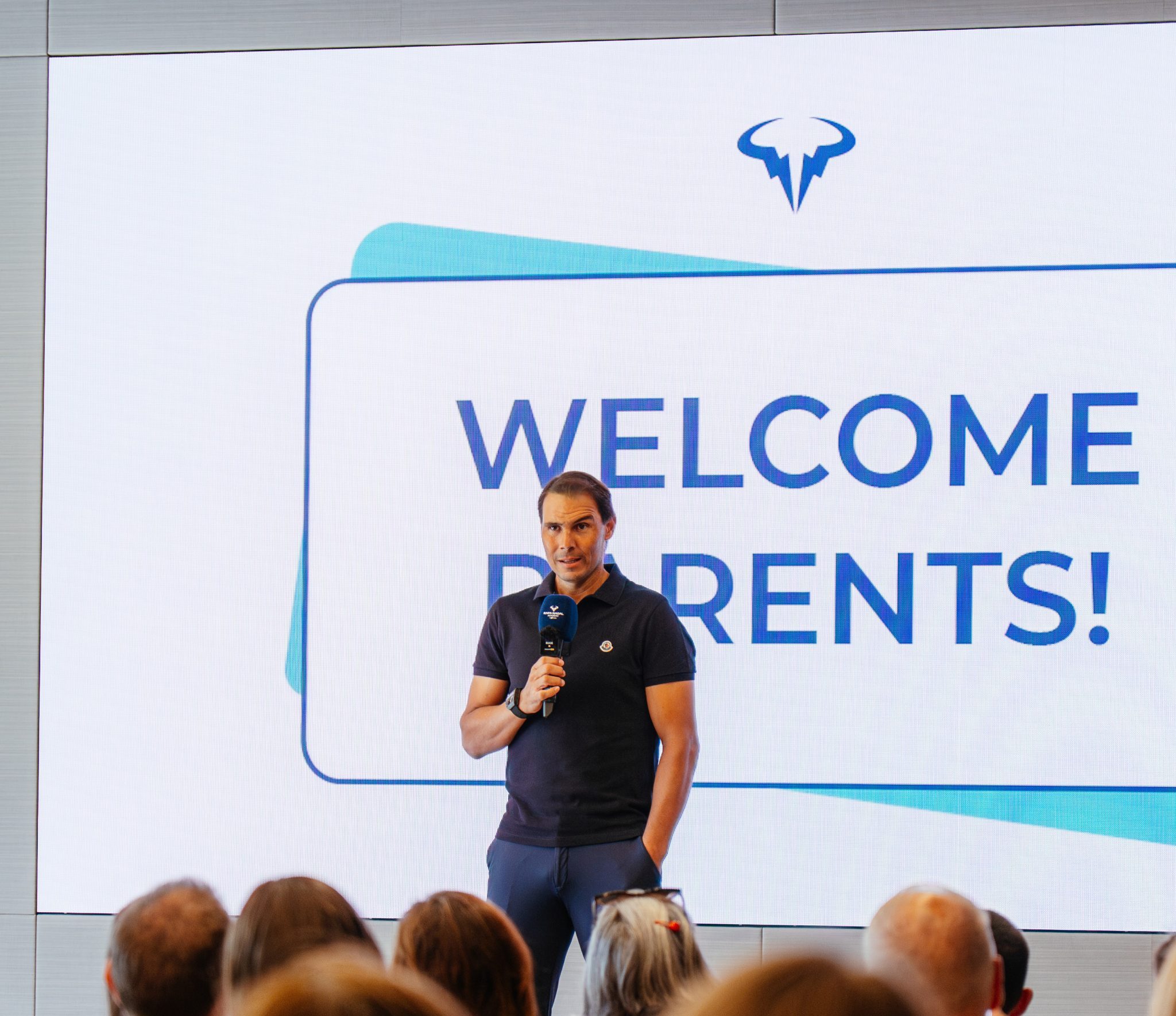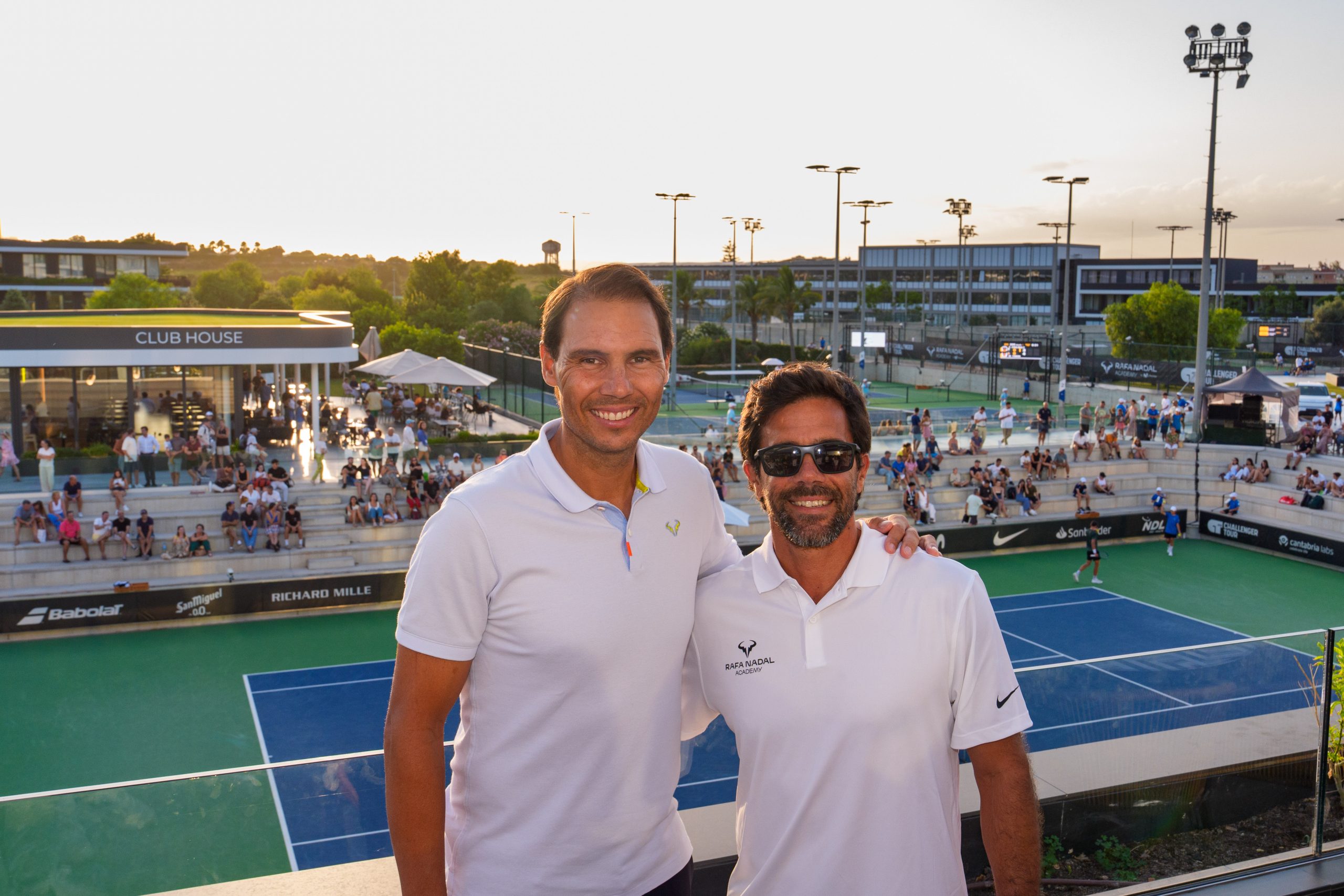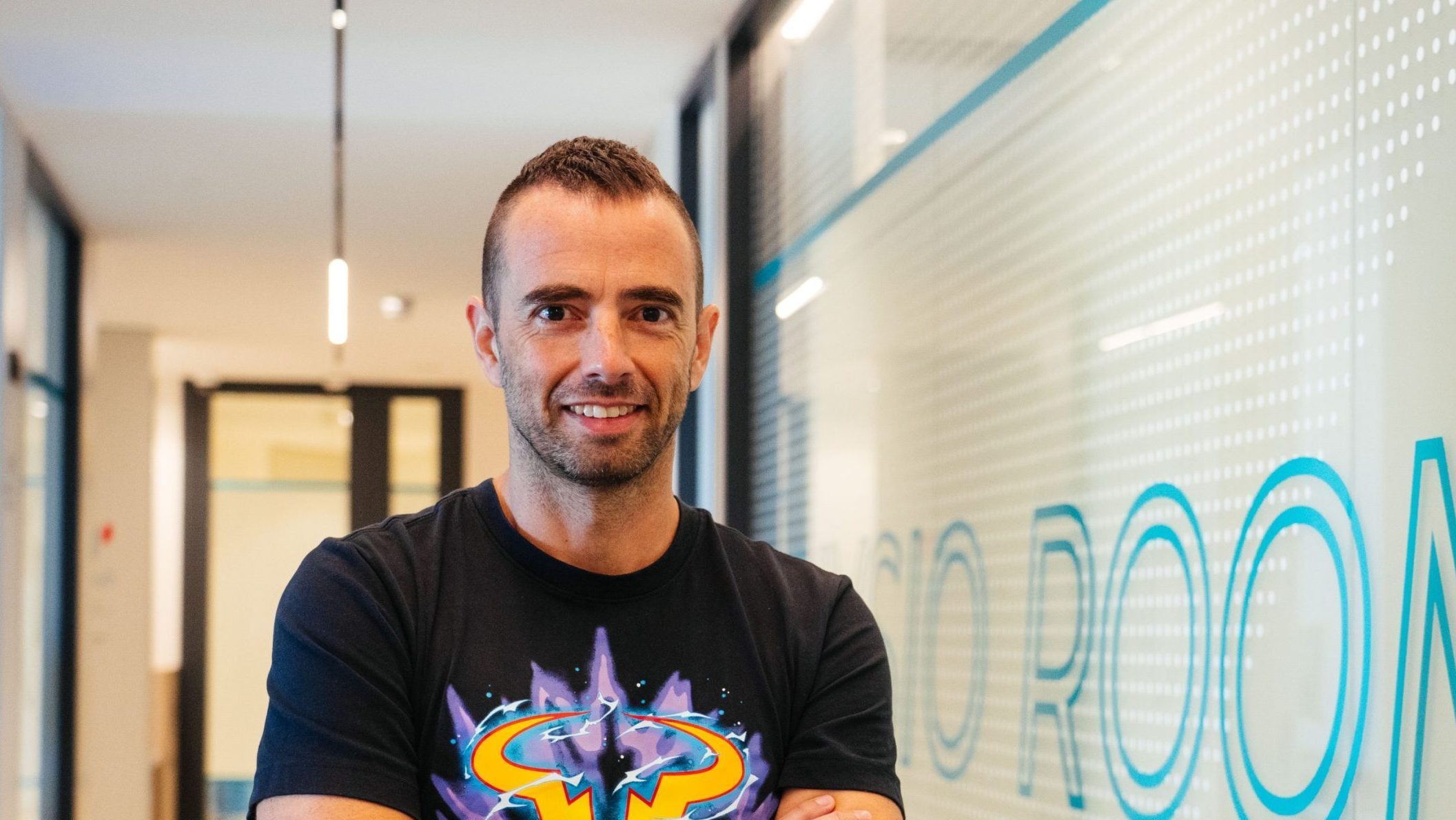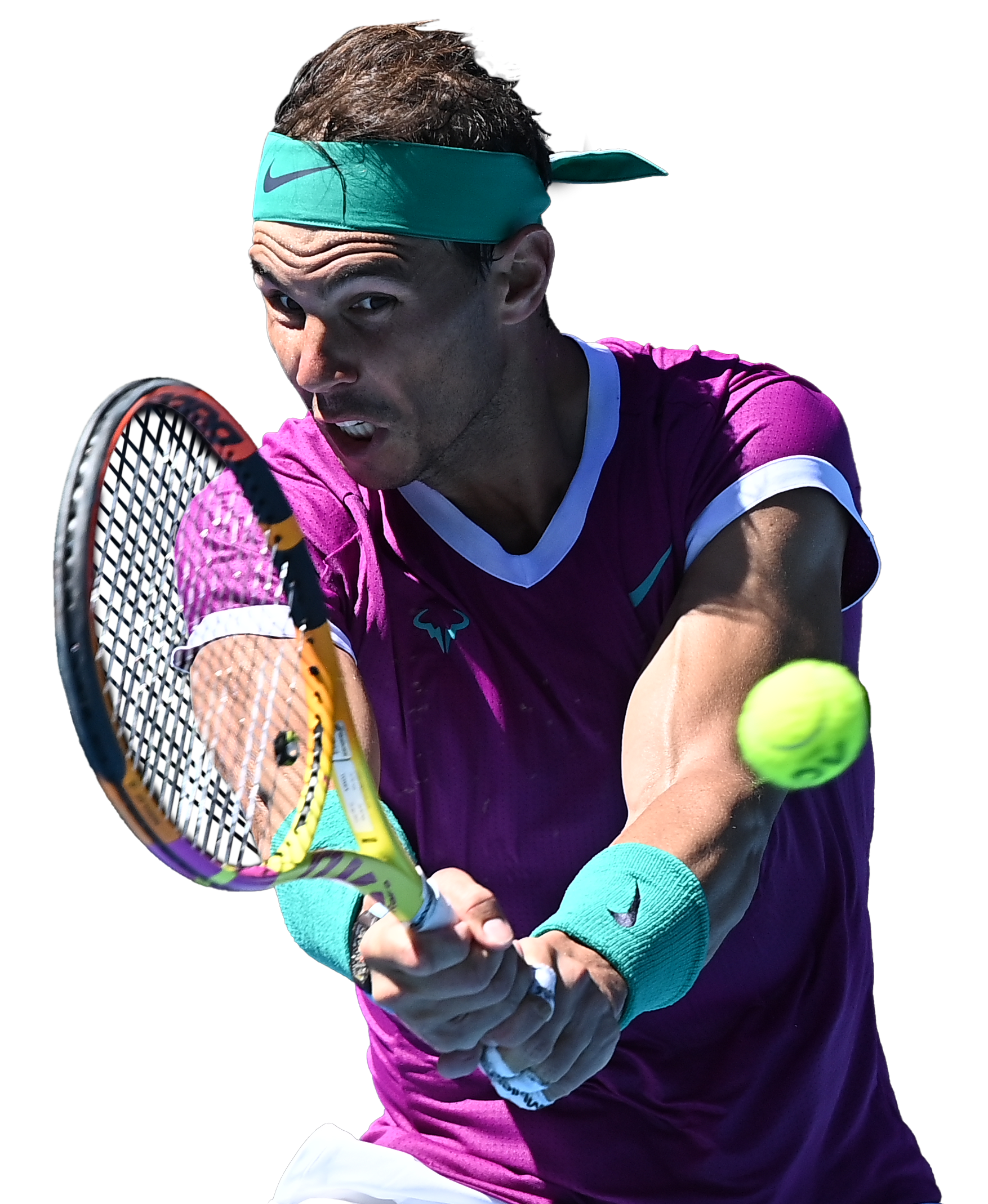Rafa Nadal awarded honorary doctorate by the University of Salamanca

Editorial RNA
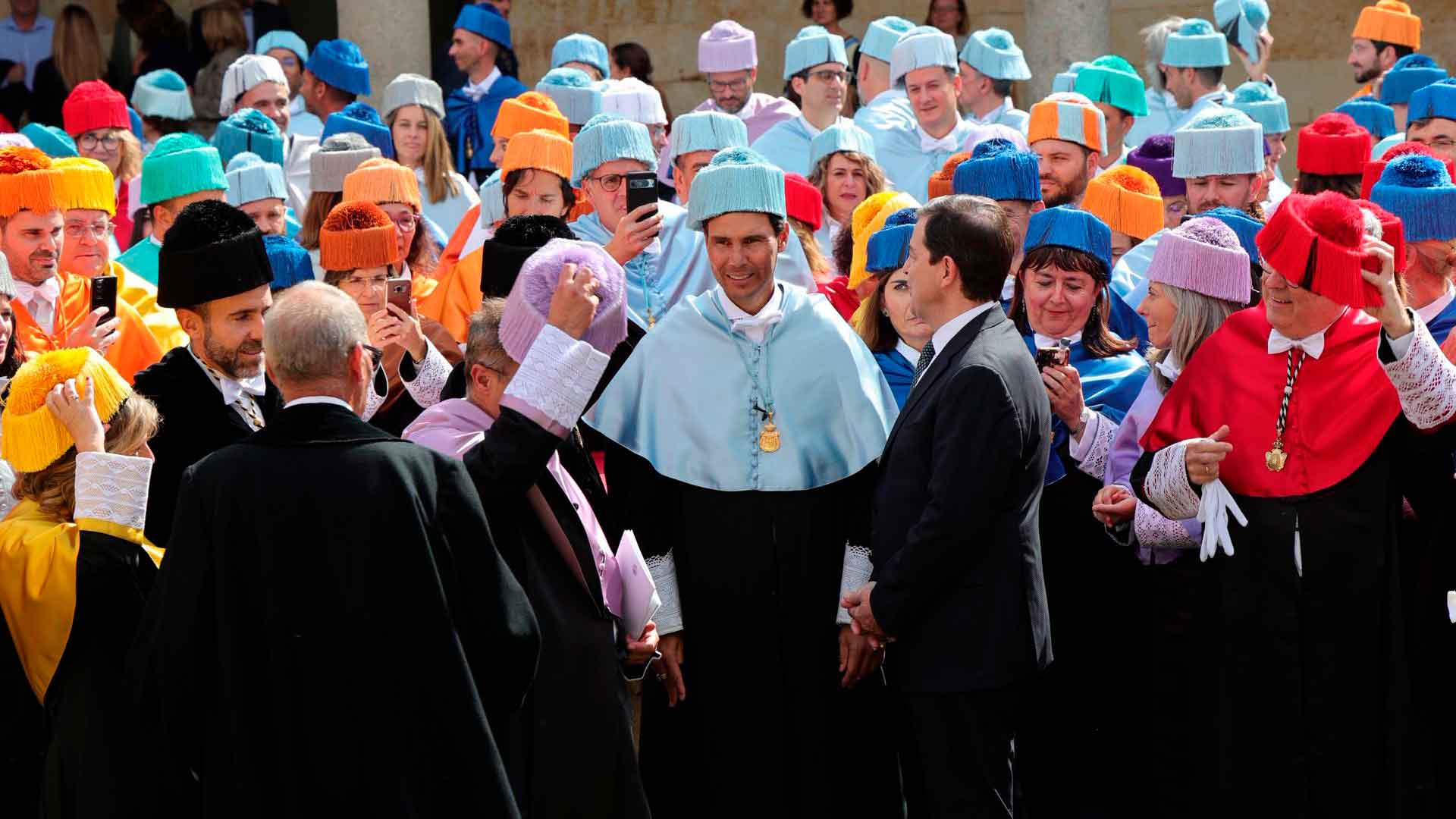
Rafa Nadal has become the first athlete ever to be awarded an honorary doctorate (Doctor Honoris Causa) by the University of Salamanca, the oldest university in Spain.
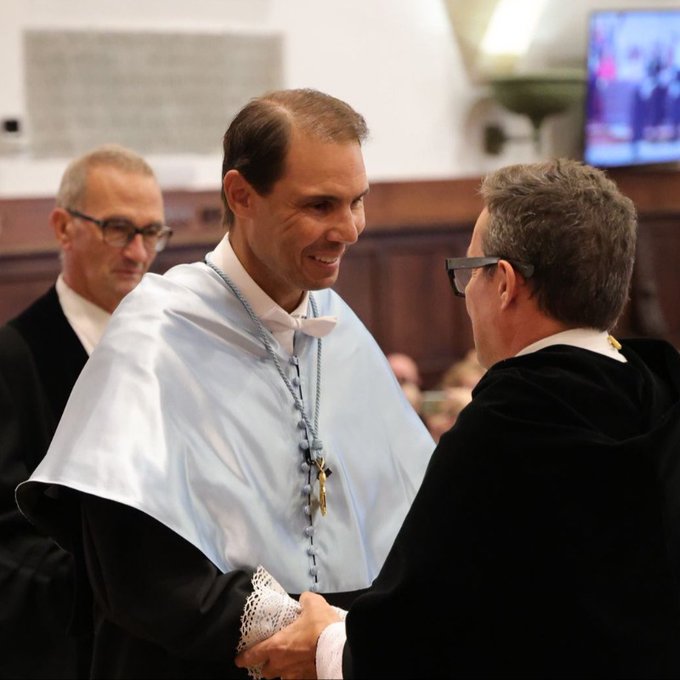
The 22-time Grand Slam champion received this distinction for his “resilience, humility, discipline, effort, and teamwork,” and described it, in his own words, as “an unforgettable day.”
The ceremony, held in the historic Paraninfo of the University, began with a video that reviewed the best moments of his professional career, before Rafa delivered his speech before the university’s faculty of doctors.
Rafa Nadal’s connection with the University is not new. For years, he has collaborated with the Alfonso X el Sabio University (UAX) in developing higher education programs aimed at training professionals in the three areas driving the sports industry: health, sport, and business.
From the Rafa Nadal Academy, we congratulate Rafa for this great recognition of his career, his values, and his legacy, which inspire us to work every day with more passion and commitment to live up to his example.
Full Speech by Rafa Nadal upon being awarded an Honorary Doctorate by the University of Salamanca
Magnificent Rector of the University of Salamanca,
Most Excellent and Illustrious Authorities,
Ladies and Gentlemen,
I would like to begin by paying tribute to this institution — so important to History, to Spain, to the academic world, and to humanity itself.
My deepest gratitude to the University of Salamanca, to its Rector, to the Dean of the Faculty of Education, to the Faculty of Doctors, and to the Governing Council of the University for granting me this very special distinction.
It is an immense honor to be the first athlete to be awarded an honorary doctorate by this university.
It is difficult for me to find the words to express what I feel at this moment.
It fills me with immense pride and gratitude to receive an Honoris Causa degree from the oldest university in Spain, and one of the oldest in the world — a place where, since the 13th century, humanism, critical thinking, and intellectual freedom have illuminated humanity.
As you know, I have not followed the traditional academic path of most people present here: my education has been different.
My life has unfolded through tournaments and on tennis courts, traveling across five continents, competing and learning from sport and from the experiences it has given me.
That is why I receive this recognition not only as a privilege but also as a mark of respect toward sport and what it represents for society.
This great honor has been granted to me — in the words of the Dean of Education — “for the recognition of my personal career and professional achievements that have inspired millions of people around the world, demonstrating that with effort, dedication, and talent, extraordinary goals can be achieved,” and I could not be happier or more grateful for that.
Since I was a child, sport has been my own school and, in some way, my own university. What I learned on the court has always stayed with me, both inside and outside tennis.
El deporte me enseñó el valor de la disciplina; nada se consigue sin esfuerzo diario, sin compromiso y sin cuidar los pequeños detalles. De poco sirve soñar en grande si no se trabaja con intensidad y con objetivos claros en el día a día y aunque pueda parecer lo contrario, es en la rutina y en el esfuerzo constante y silencioso, donde realmente empiezan a forjarse los grandes éxitos.
Sport also taught me not to feel superior to anyone, because in competitions and tournaments, as in life, no one wins all the time. There is always a rival who can defeat you, and I believe that accepting defeat, learning from it, and striving to rise again is one of the most valuable lessons I have learned over time.
Sport gave me a kind of doctorate in resilience.
I have gone through difficult moments — with injuries and uncertainty — and I have learned that what truly matters is not only to come back, but to come back with enthusiasm, with energy, and with the determination to keep fighting even when conditions are far from ideal.
Through it all, Sport — with a capital S — has taught me the importance of living it with passion. Without passion and love for what you do, it is impossible to sustain such a demanding career. Passion helps you to enjoy even the toughest moments, when effort and struggle are greatest.
Over the years, I have also learned to understand the importance of properly framing a key word for professional athletes: ambition.
For me, it was an invaluable lesson to understand and internalize that true ambition is not just about wanting to win or to achieve a goal, but about striving to improve every day, without ever losing sight of what truly matters: the values my family taught me from childhood.
A healthy ambition, where the end never justifies the means.
I remember my first training sessions in Manacor, as a child and teenager. Back then, I didn’t think about winning Grand Slams or major titles; my only dream was to improve a little every day — to hit the ball better than the day before and to give my best in every practice.
That mentality, instilled in me by my uncle Toni and my parents — to work consistently and to enjoy the process — has always accompanied me, and I am convinced that it is one of the keys to achieving any goal in life.
Allow me to share a personal anecdote that perfectly reflects what I have just said:
In 2002, still a teenager, I was very excited about one goal — to play the Junior Roland Garros tournament for the first time.
At that time, I already had some ATP points, had competed in international tournaments, and saw that event as a great opportunity to play on one of the most iconic stages in my sport.
Imagine the thrill of playing in Paris at age 15.
However, my parents told me I couldn’t participate because it coincided with my school exams.
For me, at 15, that was very hard to understand.
I had the chance to play a Junior Grand Slam, and yet they asked me to give it up for something that, back then, I didn’t value in the same way.
Despite my disappointment, my parents stood firm, and in the end, I didn’t play that tournament.
With time, I came to understand that their decision was a great lesson, and today I thank them — because they helped me finish my compulsory education and taught me that no sporting goal can ever stand above values and learning.
Miguel de Unamuno, one of the most illustrious rectors of this University, once said:
“Let us strive to be the fathers of our future rather than the sons of our past.”
Although said in another social and historical context, it perfectly captures what I have always tried to do in my career: to look forward, never settle for what I have already achieved, and work every day to build a better future, with the desire to continue learning and improving.
All these values I’ve mentioned — discipline, humility, resilience, passion — are universal.
They don’t belong only to tennis or even to sport; they can and should be applied to everyday life, to education, to research, to business, and to all aspects of society.
Moreover, sport has a unique capacity to bring us together.
After traveling the world for more than 20 years, I’ve had the privilege of meeting and competing in many countries.
In every place and every event, I have felt the affection of people from different cultures, languages, and, in many cases, ideas.
Yet we all shared the same emotion during the matches.
Sport reminds us every day that, beyond our differences, we have much in common.
It teaches us to respect our opponents, to compete with intensity and fairness, and to celebrate not only our victories but also to respect and value others’ effort.
In a world that seems increasingly divided and polarized, I firmly believe that sport can be a bridge — a meeting place that fosters coexistence, cordiality, and mutual respect.
Over the years, I have realized that sport doesn’t just shape athletes — it shapes people.
That’s why, through the Rafa Nadal Foundation and the Academy, and with the support of my family and my team, I’ve wanted to give something back by passing on those values to new generations.
Over the years, I have realized that sport doesn’t just shape athletes — it shapes people.
That’s why, through the Rafa Nadal Foundation and the Academy, and with the support of my family and my team, I’ve wanted to give something back by passing on those values to new generations.
Every day at the Foundation, we work with children and young people in vulnerable situations, offering opportunities through sport and education.
I’ve seen firsthand how sport can transform lives — teaching discipline, building self-esteem, creating a sense of community, and offering hope.
I believe that sport should have a prominent place in education systems, because it not only improves physical health but also instills values that are essential for any profession and for life in society.
I always knew that one day my professional career would come to an end — it’s the law of life — and I accepted that naturally.
What truly mattered to me was that when that moment arrived, I could look back and feel that I had helped make sport valued not only for its titles or records but for what it contributes to people and to society.
I hope that my career can inspire others to fight for their dreams, to never give up when facing difficulties, and to understand that true success is not in the result but in the journey — in the effort, the attitude, and the way one faces each challenge.
Today, in receiving this Doctor Honoris Causa, I feel that this recognition is also for what sport represents in society.
I receive it with gratitude, humility, and the commitment to continue working so that sport remains a tool for personal and social growth.
The University of Salamanca is living history — a symbol of the transformative power of education, and proof that free thought, when exercised responsibly, can also change the world.
Nelson Mandela said 25 years ago:
“Sport has the power to change the world.
It has the power to inspire.
It has the power to unite people in a way that little else does.
It speaks to youth in a language they understand.
Sport can create hope where once there was only despair.
It is more powerful than governments in breaking down racial barriers.”
Changing the world, as Mandela said, was never my goal; but behaving well at every level has always been part of my way of understanding sport and life.
Once again, I want to thank the University of Salamanca, everyone who made this recognition possible, and all those who have accompanied me on my journey:
my family, who have always been my greatest support; my team, who have stood by me through good and bad times; and also my rivals, who have challenged me and pushed me to keep improving.
I will always carry this day with me. It will serve as a great source of motivation to remain faithful to the values that sport has taught me — and that I now, in some way, share with all of you at this university, which has left such a profound mark on the culture, the society, and the thought of Spain and of humanity.
Thank you very much.

